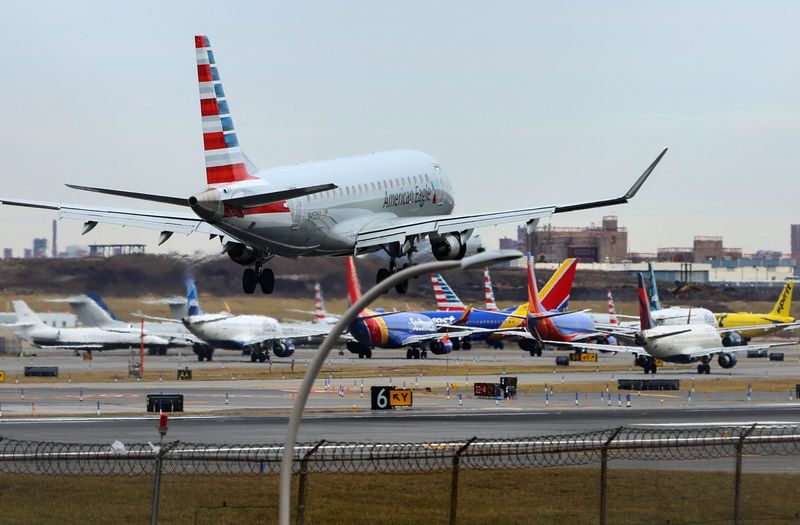US FAA tightens aircraft certification oversight after Boeing MAX crashes
2023.11.28 21:57

© Reuters. An American Airlines jet lands in front of planes backed up waiting to depart on the runway after flights earlier were grounded during an FAA system outage at Laguardia Airport in New York City, New York, U.S., January 11, 2023. REUTERS/Mike Segar/File Ph
By David Shepardson
WASHINGTON (Reuters) -The Federal Aviation Administration said on Tuesday it had adopted a new aircraft certification policy requiring key flight control design changes to be considered “major” like the system involved in two fatal Boeing (NYSE:) 737 MAX crashes in 2018 and 2019.
In late 2020, Congress passed sweeping legislation to reform how the FAA certifies new airplanes, including requiring manufacturers to disclose to the FAA certain safety-critical information, including information on systems that manipulate flight controls without direct pilot input or commands after the crashes that killed 346 people.
The FAA said Tuesday it was also issuing additional guidance to airplane manufacturers on how to identify safety-critical information and said both new steps will “improve aircraft certification safety.”
Boeing did not disclose key details to the FAA of a safety system called MCAS, which was linked to both fatal crashes and designed to help counter a tendency of the MAX to pitch up.
Boeing and planemaker Airbus did not immediately comment.
A U.S. House of Representatives report said Boeing failed to classify MCAS as a safety-critical system, which would have attracted greater FAA scrutiny during the certification process, and said the “FAA failed in its oversight of Boeing and its certification of the aircraft.”
The crashes, which have cost Boeing more than $20 billion in compensation, production costs, and fines, led to a 20-month grounding for the best-selling plane.
The FAA is still considering whether to certify two additional variants of the MAX – the smaller MAX 7 and larger MAX 10.
The FAA said in July it would establish milestones during certifcation to help “assess whether any design changes to airplane systems should be considered novel or unusual, and therefore require additional scrutiny.”
Last year, the FAA granted Boeing a shorter regulatory compliance program extension than the planemaker sought, so it can ensure the company implements “required improvements.”








